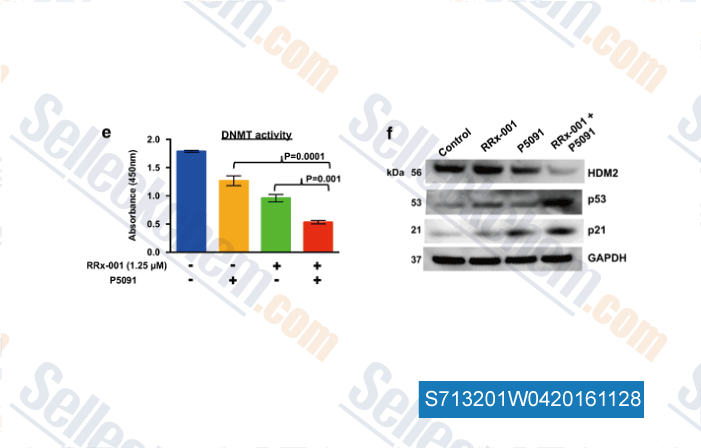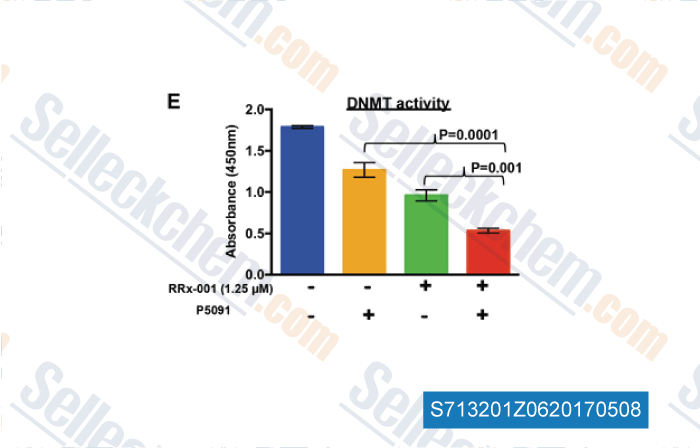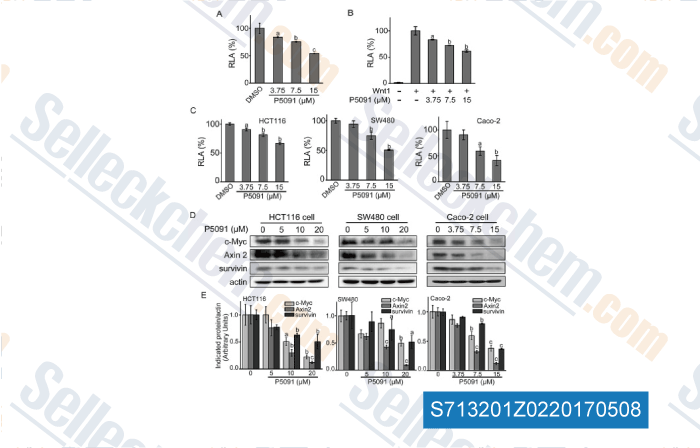|
Toll Free: (877) 796-6397 -- USA and Canada only -- |
Fax: +1-832-582-8590 Orders: +1-832-582-8158 |
Tech Support: +1-832-582-8158 Ext:3 Please provide your Order Number in the email. |
Technical Data
| Formula | C12H7Cl2NO3S2 |
||||||
| Molecular Weight | 348.22 | CAS No. | 882257-11-6 | ||||
| Solubility (25°C)* | In vitro | DMSO | 35 mg/mL (100.51 mM) | ||||
| Water | Insoluble | ||||||
| Ethanol | Insoluble | ||||||
| In vivo (Add solvents to the product individually and in order) |
|
||||||
|
* <1 mg/ml means slightly soluble or insoluble. * Please note that Selleck tests the solubility of all compounds in-house, and the actual solubility may differ slightly from published values. This is normal and is due to slight batch-to-batch variations. * Room temperature shipping (Stability testing shows this product can be shipped without any cooling measures.) |
|||||||
Preparing Stock Solutions
Biological Activity
| Description | P5091 is a selective and potent inhibitor of ubiquitin-specific protease 7 (USP7) with EC50 of 4.2 μM and the closely related USP47. | ||||
|---|---|---|---|---|---|
| Targets |
|
||||
| In vitro | P5091 is a trisubstituted thiophene with dichlorophenylthio, nitro, and acetyl substituents mediating anti-USP7 activity. P5091 exhibits potent, specific, and selective deubiquitylating activity against USP7. In contrast, P5091 does not inhibit other DUBs or other families of cysteine proteases tested (EC50 > 100 mM). P5091 inhibits the labeling of USP7 with HA-UbVME in a concentration-dependent manner. USP7-mediated cleavage of high molecular weight polyubiquitin chains is inhibited in a dose-dependent manner by P5091. Moreover, P5091 inhibits USP7- but not USP2- or USP8-mediated cleavage of poly K48-linked ubiquitin chains. USP7 inhibition by P5091 induces HDM2 polyubiquitylation and accelerates degradation of HDM2. P5091 inhibits USP7 deubiquitylating activity, without blocking proteasome activity in MM Cells. P5091 inhibits growth in MM cells and overcomes bortezomib-resistance. P5091 induces a dose-dependent decrease in viability of various MM cell lines, including those that are resistant to conventional therapies dexamethasone (Dex) (MM.1R), doxorubicin (Dox-40), or melphalan (LR5) (IC50 range 6–14 μM). P5091 overcomes bone marrow stromal cell-induced growth of MM Cells. P5091 decreased HDM2 and HDMX, as well as upregulated p53 and p21 levels. Overall, P5091-induced cytotoxicity is mediated in part via HDM2-p21 signaling axis and although p53 is upregulated in response to P5091 treatment, the cytotoxic activity of P5091 is not dependent on p53. [1] |
||||
| In vivo | In animal tumor model studies, P5091 is well tolerated, inhibits tumor growth, and prolongs survival. Combining P5091 with lenalidomide, HDAC inhibitor SAHA, or dexamethasone triggers synergistic anti-MM activity. [1] |
Protocol (from reference)
| Kinase Assay: |
|
|---|---|
| Cell Assay: |
|
| Animal Study: |
|
References
|
Customer Product Validation

-
Data from [Data independently produced by , , Leukemia, 2016, 30(11):2187-2197.]

-
Data from [Data independently produced by , , Leukemia, 2016, 30(11):2187-2197]

-
Data from [Data independently produced by , , Cell Physiol Biochem, 2017, 43(5):1755-1766]

-
Data from [Data independently produced by , , Biochem Pharmacol, 2017, 131:29-39]
Selleck's P5091 has been cited by 57 publications
| Stabilization of KPNB1 by deubiquitinase USP7 promotes glioblastoma progression through the YBX1-NLGN3 axis [ J Exp Clin Cancer Res, 2024, 43(1):28] | PubMed: 38254206 |
| ER Stress-Activated HSF1 Governs Cancer Cell Resistance to USP7 Inhibitor-Based Chemotherapy through the PERK Pathway [ Int J Mol Sci, 2024, 25(5)2768] | PubMed: 38474017 |
| Engineered Microparticles for Treatment of Murine Brain Metastasis by Reprograming Tumor Microenvironment and Inhibiting MAPK Pathway [ Adv Sci (Weinh), 2023, 10(8):e2206212] | PubMed: 36698296 |
| USP7 promotes non-small-cell lung cancer cell glycolysis and survival by stabilizing and activating c-Abl [ Clin Transl Med, 2023, 13(12):e1509] | PubMed: 38082439 |
| De-ubiquitination of SAMHD1 by USP7 promotes DNA damage repair to overcome oncogenic stress and affect chemotherapy sensitivity [ Oncogene, 2023, 42(22):1843-1856] | PubMed: 37081042 |
| Suppression of USP7 negatively regulates the stability of ETS proto-oncogene 2 protein [ Biomed Pharmacother, 2023, 162:114700] | PubMed: 37062218 |
| Endothelial progenitor cells systemic administration alleviates multi-organ senescence by down-regulating USP7/p300 pathway in chronic obstructive pulmonary disease [ J Transl Med, 2023, 21(1):881] | PubMed: 38057857 |
| USP7 Inhibits Osteoclastogenesis via Dual Effects of Attenuating TRAF6/TAK1 Axis and Stimulating STING Signaling [ Aging Dis, 2023, 14(6):2267-2283] | PubMed: 37199589 |
| USP7 attenuates endoplasmic reticulum stress-induced apoptotic cell death through deubiquitination and stabilization of FBXO7 [ PLoS One, 2023, 18(10):e0290371] | PubMed: 37874827 |
| USP7 attenuates endoplasmic reticulum stress-induced apoptotic cell death through deubiquitination and stabilization of FBXO7 [ PLoS One, 2023, 18(10):e0290371] | PubMed: 37874827 |
RETURN POLICY
Selleck Chemical’s Unconditional Return Policy ensures a smooth online shopping experience for our customers. If you are in any way unsatisfied with your purchase, you may return any item(s) within 7 days of receiving it. In the event of product quality issues, either protocol related or product related problems, you may return any item(s) within 365 days from the original purchase date. Please follow the instructions below when returning products.
SHIPPING AND STORAGE
Selleck products are transported at room temperature. If you receive the product at room temperature, please rest assured, the Selleck Quality Inspection Department has conducted experiments to verify that the normal temperature placement of one month will not affect the biological activity of powder products. After collecting, please store the product according to the requirements described in the datasheet. Most Selleck products are stable under the recommended conditions.
NOT FOR HUMAN, VETERINARY DIAGNOSTIC OR THERAPEUTIC USE.
